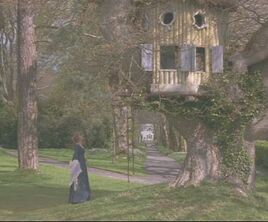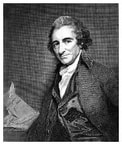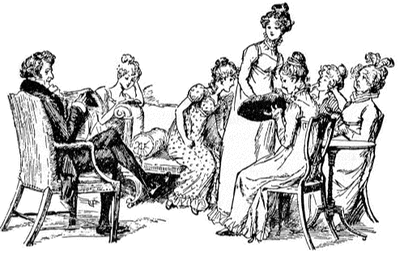 Modern readers who love Jane Austen are eager to find ways to acquit her of being a woman of the long 18th century. Clutching My Pearls is my ongoing blog series about my take on Jane Austen’s beliefs and ideas, as based on her novels. Click here for the first in the series. In this blog series, I've been discussing the values which I think are implicit in Jane Austen-- values such as pride in being English, pride in being an Englishwoman, a belief in the idea of human progress, the maintenance of class distinctions, and decorum in religion. Now we turn to primogeniture. |
So exclaims Mrs. Bennet in Pride & Prejudice. A bleak future awaits the Bennet girls because Longbourn is entailed on the heirs male, and Mrs. Bennet frets about it frequently. Austen goes on to write:
| "Jane and Elizabeth tried to explain to her the nature of an entail. They had often attempted to do it before, but it was a subject on which Mrs. Bennet was beyond the reach of reason, and she continued to rail bitterly against the cruelty of settling an estate away from a family of five daughters, in favour of a man [Mr. Collins] whom nobody cared anything about." Elizabeth and Jane are presented as calmly accepting the status quo, while Mrs. Bennet is the rebel who is "beyond the reach of reason." |
Mrs. Bennet, in other words, would not be your first choice as a poster girl for the campaign to overthrow primogeniture.
The life-changing event of getting an inheritance was a extremely common device in many novels and plays. In Northanger Abbey, Elinor Tilney is able to marry the man she loves after Austen ruthlessly dispatches her sweetheart's older brother. A missing heir shows up in the play, “The Heir at Law,” which is the play Tom Bertram wanted to perform at Mansfield Park. Sometimes the heiress is a girl, like Jane Eyre or Anne de Bourgh or Miss Grey with her fifty thousand pounds in Sense & Sensibility.
Certainly inheritance is the event that kicks off the plot of Sense & Sensibility, but is there a hidden message of protest as well? Was Austen opposed to primogeniture? This is what Helena Kelly argues in Jane Austen: the Secret Radical. Dr. Kelly asserts that Sense & Sensibility is a subversive attack on primogeniture, the practice of leaving the family estate to the oldest son, or closest male heir. (An "entail" was an additional restriction put on the estate that controlled who could inherit and what they could do with the property.) But as usual, Dr. Kelly does not ask the preliminary and important question, which is, does Austen handle the topic of inheritance in the same way as her fellow authors, or is she at odds with them? In other words, is she being radical when she starts a book with death and inheritance?
 Elinor (Emma Thompson) explains to her sister Margaret that houses pass from father to son
Elinor (Emma Thompson) explains to her sister Margaret that houses pass from father to son There are obvious pros and cons around primogeniture. The economic argument is that it’s best to keep large estates intact and functioning. Just as you can’t chop a country up in pieces and give one to each prince every time the king dies, you can’t divide up an estate. That is, you could do it, but the downside is pretty apparent. Austen's favourite moral essayist Dr. Samuel Johnson defended primogeniture, arguing that it was good for the younger sons to have to earn their own way in life. Character-building stuff. As Johnson allegedly put it, primogeniture "makes but one fool in a family." The heir was too apt to turn out like Mansfield Park's Tom Bertram, "who feels born only for expense and enjoyment."
However, Adam Smith, a Scottish philosopher we call the father of modern economics, was opposed to primogeniture. Smith decided it encouraged “a certain class of people to live beyond their means and not contribute to progress through investment and improvement.”
 Massacre at Nantes.
Massacre at Nantes. That was the debate about primogeniture leading up to the time of the French Revolution. Then primogeniture became one of several issues which, bundled together, were at the centre of a fierce debate when Austen was a teenager.
Revolutionary France put an end to monarchy, the aristocracy, and primogeniture. Some people in England thought that all sounded like a great idea. Then the revolutionaries in France really went to town and abolished the Catholic church, renamed days of the week and the days of the month, and reset the calendar to year zero. In between chopping off a lot of heads and drowning thousands of people in the river at Nantes.
The Reign of Terror caused a huge backlash in England. Those who had initially been favourable to--or at least interested in--the French Revolution, found themselves in big trouble. Thus anyone advocating the abolishment of primogeniture at that time would be associated in the public mind with those crazies over there in Revolutionary France. As historian Rory Muir, author of a new book about the effect of primogeniture on younger sons, states: "Inequality of various kinds was universal [in Austen's time] and taken for granted, challenged only by the most radical and impractical of political philosophers and French Republicans in the most extreme phase of their disastrous revolution."
There are several towering names in this debate. Edmund Burke is considered the father of conservatism because of his book Reflections on the Revolution in France, which correctly predicted that the revolution would take a violent turn. Mary Wollstonecraft disagreed so vehemently with Burke that she published her response, A Vindication of the Rights of Men, just a few weeks after his book. She later followed up with her iconic A Vindication of the Rights of Women.

Thomas Paine, the passionate radical polemicist, made strong economic arguments against primogeniture. He thought large estates should be heavily taxed and the wealth distributed. Also, he pointed out that the younger sons of the aristocracy were parasites on the economy, because the Crown gave them ceremonial and salaried “posts, places and offices,” like Master of the Rolls, etc, all of which was paid for by the general revenue.

The French Revolution, as we've seen, made primogeniture a hot-button topic while Austen was writing her first draft of Sense & Sensibility. Therefore, if Austen opposed primogeniture, it was a radical thing at that time.
Let’s look next at Sense & Sensibility and Austen’s other novels to see if she was sympathetic to actually abolishing primogeniture, like the English radicals.
| In my Mansfield Trilogy, Thomas Bertram is the heir to Mansfield Park but he looks unlikely to have an heir himself, which would mean that Edmund Bertram or his son would inherit, a fact of great interest to Mary Crawford. Click here for more about my novels. |

 RSS Feed
RSS Feed